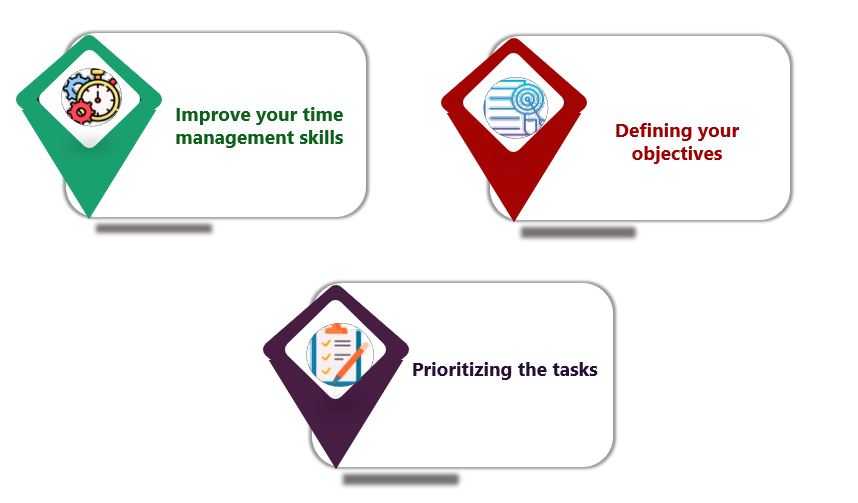Tips To Time Management In Personal Development Plan

Personal improvement goals are those you set for yourself in order to change your life's outcomes and the overall experience.
What are Personal Development Goals?
Any achievement related to improving yourself through ability training, character-building experiences, engaging with others, improving your understanding of yourself and your talents, or how you imagine the possibilities for your future can be considered a personal objective.
Components of Personal Development Plan
To help you accomplish your personal development goals, a successful personal development plan follows a specific framework. The following steps are included in the procedure:
(1) Defining your objectives
It's time to set goals that are in line with what's most important to you now that you've figured out what's most important to you.
Setting goals that are in line with your personal ideals improves your chances of succeeding.
You will be more driven to achieve your goals if they fit with your beliefs.
If your aspirations, on the other hand, contradict your values, you'll build internal tension that will prevent you from going where you want to go.
And if you reach them, your accomplishments will not bring you true fulfillment and happiness.
You will feel conflicted and remorseful in the end.
(2) Prioritizing the tasks
Setting project goals involve the following steps:
- Make a list of duties and activities.
- Make a list of what you intend to get done in a day. Don't think about the order or number of tasks you are writing down at this stage.
- Assess the significance of each assignment
.jpg)
The next step is to rank the tasks according to their contribution to the project's worth.
Priorities may also be defined depending on the number of people affected.
Answering what consequences a particular project has can also aid in task ranking.
We will now go through some of the most effective prioritization strategies that can assist you in this phase.
(3) Improve your time management skills
Prioritizing also means deciding how much time you want to devote to each responsibility.
People either devote too little or too much time to completing a mission.
Productivity is harmed in both scenarios. Make sure you just commit the maximum amount of time to a project.
What Is Time Management?
Is time management a skill? The method of making the best use of one's time is referred to as time management.
In the workplace, time management is a method that company owners can use to boost efficiency, minimize tension, and achieve their objectives.
Employees benefit from these productivity skills because they help them stand out in their current role and because they are transferable skills that can be applied through sectors and professions.
.jpg)
Time Management Skill #1: Plan ahead of time
To begin, make a to-do list for the following day the evening before or the night before.
The best exercise is to prepare the whole day for the next day as your final task before leaving work.
The subconscious works on your plans and aspirations as you sleep as you schedule your day the night before.
Frequently, you will wake up with thoughts and experiences that are relevant to your day's work.
Making your regular list the night before has a number of advantages, one of which is that it helps you to sleep better.
One of the most common causes of insomnia is trying to remember what you need to do the next day while lying awake.
Time Management Skill #2: Increase Productivity with Prime Time
Organize your life so you can focus on innovative projects during your internal "prime time."
Your internal prime time, as calculated by your body clock, is the time of day when you are most alert and efficient.
For the most part, this occurs in the morning. For others, though, it is in the evening.
On rare occasions, a writer, performer, or entertainer can find that her prime time is in the early hours of the morning.
To achieve all of your goals, you must listen to your body and determine your own prime time.
If learning how to write a book is one of your priorities, you can set aside some of your free time to prepare, write, edit, and promote your book.
.jpg)
Time Management Skill #3: Stop Procrastinating
Do you have a project in mind that you're very excited about?
Make today the day you finish your project.
Every day you put off a task, you add to the tension around it, and as a result, the overall stress level increases as the task lingers in your mind.
Not to mention the fact that last-minute work is seldom of high quality, and if the job is critical, you want to be able to complete it to your full ability.
Even if you don't want to, doing the toughest, longest job first is a good time management skill.
It won't be enjoyable, but once you have completed it, you will be free to spend the rest of your day without the sword of Damocles looming over your head.
Time Management Skill #4: Delegation/outsourcing
You will want to delegate work to others, just as others will want to delegate work to you.
You will want to make sure that all of the necessary work is completed, but you don't have to do it yourself.
One of the most critical time management skills is recognizing when you are not the best person for the job.
.jpg)
You should consider delegating the role if it is ideally suited to someone else's skill set.
Naturally, you must provide all relevant details and ensure that the individual performing the role understands what is required of them when delegating.
Delegation/outsourcing entails more than just transferring jobs from our hands to someone else's.
You want the job done correctly the first time, by the right person, and to the highest standards possible.
You must not only hand over the work with specific directions, but you must also check in with the individual doing the work to see whether they are finishing it or whether they need help.
(4) Complete the task
What good is a priority list if you can't keep it up with it?
The issue for many of us is not making a list and prioritizing it, but sticking to it.
So, if the tasks piling up during the day aren't significant, don't get frustrated. Don't respond to anything that happens to you.
(5) Progress evaluation
Follow the simple steps outlined below to monitor your progress.
Step 1: Take a look at the week ahead. Get a rundown of the events of the previous week. Examine each day and consider all that occurred.
Step 2: Look for the positives. Examine the goals you set for yourself and achieved. Look for patterns in your behaviors that are optimistic.
.jpg)
Step 3: Look for flaws. Take a look at the things you wanted to get done but didn't. Look for any bad habits you may be developing.
Step 4: Write a report of your findings. Take notes and make a summary of your whole week, both good and bad. This will give you an idea of where you might go next week.
Step 5: Make a plan for the coming weeks. The final move is to apply what you've learned from the previous week to the next week's planning.
Protect yourself from the negatives and focus on the positives.
The aim of setting personal development goals is to improve your life on a continuous basis.
These objectives have tangible and intangible effects on you.
Some personal growth goals may be related to enhancing your patience with others, while others may be related to furthering your education in some way.
Author Bio
The Editorial staff includes content researchers from various areas of knowledge. They add a plethora of expertise to the Hubslides Editorial team. They constantly and frequently oversee, produce and evaluate contents that are most ideal to aid impacting knowledge to readers.
Article Comments
No Comments!
At present there are zero comments on this article.
Why not be the first to make a comment?
Similar Articles
Sponsor
Search Articles
Experts Column
Latest Articles
Featured Articles
Most Popular Articles













